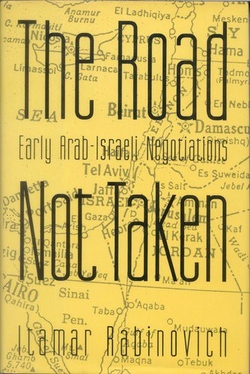 My favorite anecdote in The Road Not Taken neatly illustrates the special character of Arab-Israeli relations in the 1949-52 period that is its subject.
My favorite anecdote in The Road Not Taken neatly illustrates the special character of Arab-Israeli relations in the 1949-52 period that is its subject.
The scene: armistice negotiations between the Syrian and Israeli governments, with both sides represented by military officers.
The background: Israel has been in existence only a year, all of it under the leadership of David Ben-Gurion; its political structure and orientation is still unclear. On the other side, Husni Za'im, a military dictator, has just taken power in Syria.
The action: a Syrian approaches his Israeli counterpart and offers to assassinate Ben-Gurion, thereby allowing the Israeli military to take power in Jerusalem. Rather than rebuff this wild scheme, the Israelis play along with it for months, only to learn that it is the brainchild of Husni Za'im himself. Za'im hoped to place a friendly general in Israel so that the two of them could proceed to take control over the Middle East!
This bizarre incident gives a sense of the freewheeling, unpredictable quality of the three-year period following the State of Israel's birth. It was a time of transition when inter-Arab relations and the Arab-Israeli conflict were more fluid than ever since. On several occasions, Arabs and Israelis got close to achieving a breakthrough, but it never quite happened. These episodes continue to haunt Israelis, who wonder: Was the bitter and lengthy conflict with the Arabs fated to be? Or could most of it have been settled early on, had only Israeli leaders been more flexible?
This debate has been especially vital in recent years, as Israeli, British, and American government archives have opened. Indeed, new data has spawned a revisionist school in Israel, one which argues that peace could have been attained, had Ben-Gurion and his aides only been open to it. Avi Shlaim, possibly the most prominent of these authors, maintains that the negotiations failed principally because of "Israel's strength and [Jordan's King] Abdallah's weakness." He squarely blames the nascent Jewish state (as summarized in this book): "Israel's intransigence was greater than that of the Arabs."
Itamar Rabinovich, the distinguished historian and current rector of Tel Aviv University, dwells on this issue in his meticulously researched and important study, The Road Not Taken. Analyzing separately Israeli negotiations with the Syrian, Jordanian, and Egyptian governments, he draws the regretful but convincing conclusion that peace was not possible. With regard to Syria, for example, he writes that an accord with Syria's Za'im would more closely have resembled the abortive Lebanese-Israeli agreement of 1983 than the Camp David Accords with Egypt. And the same goes for the Jordanian and Egyptian cases. In brief, the road not taken ended up in more or less the same place as the one taken.
Why this pessimism? Because of the dynamics of Arab politics in 1949-52. Rabinovich stresses a subtle but critical point: although radical regimes were not yet in power (Gamal Abdel Nasser's coup took place in July 1952), radical perspectives already affected the actions of governments. Abdullah, for example, could no longer ignore left-wing urban politicians, much less the Palestinian population he had so rashly annexed to his once-quiet country. King Faruq may be remembered today as just an obese playboy, but his stubborn hatred of Israel blocked the possibility of Egypt settling with Israel. In this sense, the rulers of 1949-52 anticipated their more belligerent successors.
For an American, the Israeli debate about the late 1940s recalls the controversy that once raged in this country over the origins of the Cold War. If our revisionists could, against all odds, blame Harry Truman for the Cold War (letting Joseph Stalin off the hook), surely theirs can blame Israel. They merely need to ignore rudimentary facts - that Israel accepted the United Nations partition plan and its enemies did not; that Israel was invaded by five states within hours of its birth; that it was democratic and its enemies not; and so forth.
Rabinovich's fine research and sensible conclusions add a dose of reality to what has become a rush to historical contrition that, one suspects, has more to do with current frustrations than past ones. With luck, the revisionists will give up their strange claims. But should they persist anyway, here's a fair warning: The opening of the Soviet Union is making Stalin's American apologists look awfully foolish. When the state archives of Syria, Jordan, and Egypt someday open, a similar fate may await Shlaim and company too.